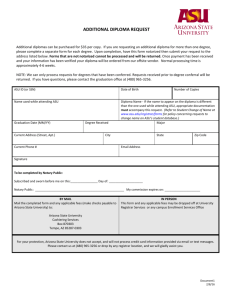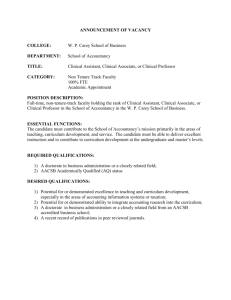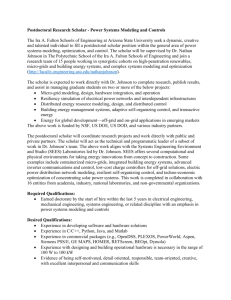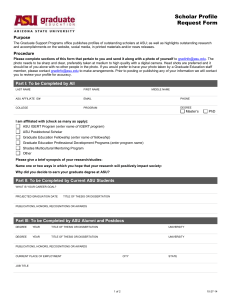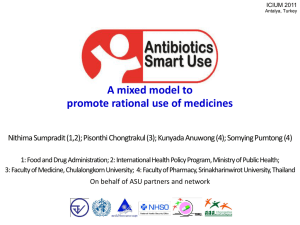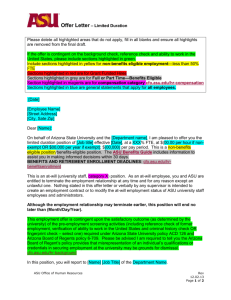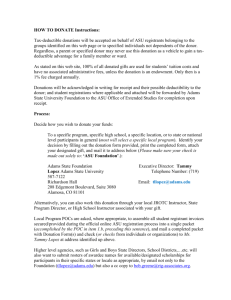barrett-honors-nursing-description
advertisement
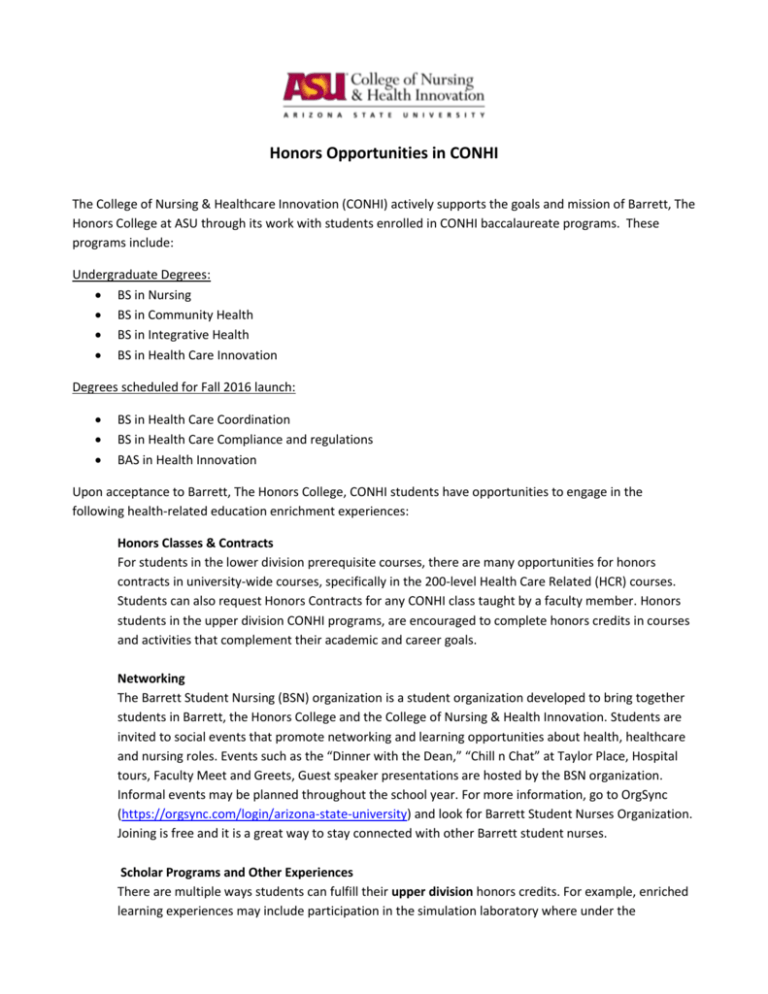
Honors Opportunities in CONHI The College of Nursing & Healthcare Innovation (CONHI) actively supports the goals and mission of Barrett, The Honors College at ASU through its work with students enrolled in CONHI baccalaureate programs. These programs include: Undergraduate Degrees: BS in Nursing BS in Community Health BS in Integrative Health BS in Health Care Innovation Degrees scheduled for Fall 2016 launch: BS in Health Care Coordination BS in Health Care Compliance and regulations BAS in Health Innovation Upon acceptance to Barrett, The Honors College, CONHI students have opportunities to engage in the following health-related education enrichment experiences: Honors Classes & Contracts For students in the lower division prerequisite courses, there are many opportunities for honors contracts in university-wide courses, specifically in the 200-level Health Care Related (HCR) courses. Students can also request Honors Contracts for any CONHI class taught by a faculty member. Honors students in the upper division CONHI programs, are encouraged to complete honors credits in courses and activities that complement their academic and career goals. Networking The Barrett Student Nursing (BSN) organization is a student organization developed to bring together students in Barrett, the Honors College and the College of Nursing & Health Innovation. Students are invited to social events that promote networking and learning opportunities about health, healthcare and nursing roles. Events such as the “Dinner with the Dean,” “Chill n Chat” at Taylor Place, Hospital tours, Faculty Meet and Greets, Guest speaker presentations are hosted by the BSN organization. Informal events may be planned throughout the school year. For more information, go to OrgSync (https://orgsync.com/login/arizona-state-university) and look for Barrett Student Nurses Organization. Joining is free and it is a great way to stay connected with other Barrett student nurses. Scholar Programs and Other Experiences There are multiple ways students can fulfill their upper division honors credits. For example, enriched learning experiences may include participation in the simulation laboratory where under the supervision of faculty, students experience patient simulation of real life scenarios. Selected didactic and practice courses that offer study of interest in the following areas may also be taken for upper division honors credits: Adult health Children’s health/Pediatrics Community health Gerontology Psychiatric/Mental health Women’s health/Maternity Special Topics, e.g. homelessness, violence, global health Independent Study and Internships Honors credit may be earned through independent study, research or internships. In these enriched learning experiences, students work with faculty in research or community health projects to gain hands-on experience in their area of interest. Students may select from a wide array of research specialties that expand beyond CONHI and include areas such as maternal child nutrition, lactation, obesity, healthcare innovation, sleep, health inequities/disparities, and health policy to name a few. Some of the projects students have been involved in have ranged from collecting data for an obesity prevention grant to health screening at a local community center for people experiencing homelessness. Honors credits (up to 3 credits) in independent study are possible by enrolling in NUR 499. Enrollment in this course requires approval by the faculty member the student would like to work with, and identification of specific objectives that the student will meet over the course of a semester. Please contact the Barrett Faculty Honors Advisor(s) if you are interested in independent study and need assistance in identifying faculty members of interest. Research & Thesis/Creative Project Opportunities Faculty members in CONHI employ and advise students in conducting academic research on a wide array of health-related topics. These include potential Honors thesis projects as well as broader learning experiences in health related CONHI and community events. CONHI Faculty Honors Advisors The designated Honors Advisors for the CONHI are Clinical Associate Professor, Dr. Carol Stevens, and Assistant Professor, Dr. Megan Petrov. They facilitate students majoring in CONHI programs in identifying potential topics of interest for their thesis/creative projects and selection of the most appropriate thesis/creative project committee director. Address questions about the honors program for CONHI students to Dr. Carol Stevens at Carol.Stevens@asu.edu and/or Dr. Megan Petrov at Megan.Petrov@asu.edu. Details on the nursing major can be found at the CONHI web site at: https://nursingandhealth.asu.edu/. Your Honor’s Thesis with CONHI Honor’s Thesis Credits Students must enroll in 3 credits of NUR 492: Honor’s Directed Study (thesis preparation: development of idea/topic, establish thesis Director & committee members) in one semester followed by 3 credits of NUR 493: Honor’s Thesis (thesis/project implementation) in the next or subsequent semester(s). These courses cannot be taken simultaneously and must be taken consecutively, beginning as early as Junior 1. Most Barrett Honors Nursing students enroll in NUR 492 two to three semesters before graduation. CONHI Graduates - Barrett Thesis Committee Requirements CONHI students must have, at a minimum, two faculty members on their thesis committee; a Thesis Director and a Second Committee Member. Students must chose a full-time clinical or tenure/tenure track faculty in CONHI as their Thesis Director. If interested in having faculty from another ASU College as a Thesis Director, the Thesis Director position would be shared and both faculty (one from CONHI and the other from the other college) would be Co-Directors. The Second Committee Member may be a full-time, part-time, or adjunct ASU faculty member from any ASU Department or College. Exceptions to this thesis committee structure are approved on an individual basis. Please contact the CONHI Barrett Faculty Honors Advisors if you would like to discuss a change in the committee structure for your thesis/creative project. Although only two committee members are required for CONHI Barrett Nursing Students, three members are encouraged in situations where additional expertise or assistance is needed. This is especially true for students who are tackling interdisciplinary projects for their thesis project and/or for students who are doing research in the community and may need a member outside the university to serve on their committee. The third committee member can be any faculty or person from the community at large. All committee members must be agreed upon by the student and the thesis director. Thesis Preparation Honor’s students are strongly encouraged to identify a thesis topic by the first or second semester of their junior year, at the latest. In order to develop a feasible project, students should contact faculty members with expertise or interests in the area in which they would like to work. To discuss your thesis ideas broadly, or to help identify relevant faculty members for your goals and interests, we encourage you to contact early in your thesis preparation plan, the CONHI Barrett Faculty Honors Advisors: Carol.Stevens@asu.edu and Megan.Petrov@asu.edu. For all forms related to the thesis / creative project, please go to: http://barretthonors.asu.edu/academics/thesis-and-creative-project/forms-important-dates/ Faculty Reference Form - Research / Areas of Interest (2014-2015) Faculty Name Contact Info Phone Research - Areas of interest Marianne McCarthy marianne.mccarthy@asu.edu Lesly Kelly lesly.kelly@asu.edu intimacy in residents with dementia, delirium, non-pharmaceutical interventions in dementia 602-496- patient outcomes; nursing workforce; 0809 large database research Johannah Glover johannahuriri-glover@asu.edu dementia; family caregivers; sleep Brenda Morris brenda.morris@asu.edu Barbara Fargotstein Ann Lyles barbara.fargotstein@asu.edu Sunny Kim Sunny.Kim@asu.edu Donna Velasquez Megan Petrov donna.velasquez@asu.edu Cha-Nam Shin Cha-nam-shin@asu.edu Carol Stevens Nancy Baumhauer Judy Sayles Kelly Froehlich Brenda Dechant Rebecca Lee Narayanan Krishnamurthi Annmarie.Lyles@asu.edu megan.petrov@asu.edu 602-496- nursing education; teaching/learning 0850 practices ethics; psych mental health adolescent boy's perception of self using avatars health disparities in cancer prevention/screening; support groups interprofessional education; nurse practitioner 602-496- sleep health disparities in relation to the 2297 development of chronic illnesses (e.g. stroke, CVD, pain related conditions) and mental illness; insomnia; behavioral sleep medicine cardiovascular disease prevention & management Carol.stevens@asu.edu 602-496- Adolescent obesity, Community based2215 participatory research, Nursing education, Evidence-based practice, Research Nancy.Baumhover@asu .edu 480-510- critical care; nursing education; research 8515 qualitative & quantitative; nursing theory, philosophy Judy.sayles@asu.edu 602-496- substance abuse 0811 Kelly.Froehlich@asu.edu 480-241- Breast cancer; pain control in PACU; 1685 Brenda.dechant@asu.edu 480-296- Post traumatic stress syndrome 5114 relee6@mainex1.asu.edu 602-496- Physical activity and diet (fruit & 0910 vegetable intake) in children; Hispanic/ Latino populations Narayanan.Krishnamurthi@asu.edu 602-496- Physical activity based intervention to 0912 improve quality of life; Quantitative functional evaluation; yoga to improve balance and gait in patients with Parkinson's disease Kathleen LuPone Kathleen.lupone@asu.edu 602-496- critical thinking in nursing education 6073 cell 6026943707 homelessness Kay Jarrell Kay.jarrell@asu.edu David Coon David.coon@asu.edu family caregiving for older adults Shirley Kleinlein Shirley.kleinlein@asu.edu homelessness; veteran's health; community health Jennie Bever jennie.bever@asu.edu Diana Jacobson diana.jacobson@asu.edu Angela ChiaChen Chen breastfeeding; metabolic disease & diabetes; obesity; PCOs 602-496- child and adolescent obesity; healthy 0863 lifestyle interventions; mental health 602-496- technology-based prevention 0832 interventions for HIV/STI, HPV vaccination, mental health and substance use issues among ethnic minority and immigrant youth Debbie Hagler dhagler@asu.edu Kimberly Vana kimberly.vana@asu.edu Marcia Jasper Marcia.jasper@asu.edu Liz Harrell s.sloan@asu.edu Brenda Hosley Brenda.hosley@asu.edu Jack Gilbert jack.gilbert@asu.edu Michael Todd mike.todd@asu.edu Nathalie Rennell Sandra Kirkpatrick Pauline Komnenich nathalie.rennell@asu.edu Shawn Youngstedt shawn.younstedt@asu.edu Karen Butterbaugh Craig Thatcher karen.butterbaugh@asu.edu Kim Sutter kimberlee.sutter@asu.edu Vanessa Nelson Hill Vanessa.hill@asu.edu Sandra.Kirkpatrick@asu.edu Paulina@asu.edu craig.thatcher@asu.edu 602 4960802 clinical decision making, teaching/learning with technology, simulation 623-496- teaching/learning; sleep topics; 2230 pulmonary issues 602-496- perinatal 0742 Homelessness, Motivational Interviewing, Intraprofessional Education 602 4961423 alternative and complimentary medicine ; health disparities; general mental health issues; cultural diversity organizational ethics, personal integrity, innovation leadership 602-496- My expertise: quantitative methods, 0917 diary methods. potential thesis topics: stress and coping 602-316- holistic health; health and wellness 1130 602-359- homelessness, veteran's health; 1155 community health 602-496- nursing education; ethics; family 0861 caregiving, palliative care 803-767- Effects of sleep restriction, is long sleep 3208 hazardous? Mental health and sleep interventions 480-452- female veteran's health (perinatal) 2079 602-496- nutrition & disease; oxidative stress 0092 602-496- pediatrics, siblings, chronic illness, 0833 simulation 602-496- health policy 2247 Aliria Munoz Aliria.munoz@asu.edu Pamela Storto pstorto@asu.edu Meredith Milowski Eve Krahe meredith.milowski@asu.edu Kathy Kenny katherine.kinny@asu.edu Cathy Lalley Clalley@asu.edu Daniel Crawford daniel.crawford@asu.edu eve.krahe@asu.edu Updated August 2015 cs/mp 480-309- complex care/ICU; transcultural nursing 1856 practice; environmental impact of healthcare 602-339- maternal child health 1682 maternal newborn nursing 602-496- Healthcare innovations, innovation 1804 leadership; philosophy of science complexity 602-496- neuroscience, palliative care, patient 1719 education, leadership, pain management, innovation 602-496- nurses use of health information, 1805 technology & work around; healthcare innovation pediatrics, pediatric neuroscience, social determinants of health

